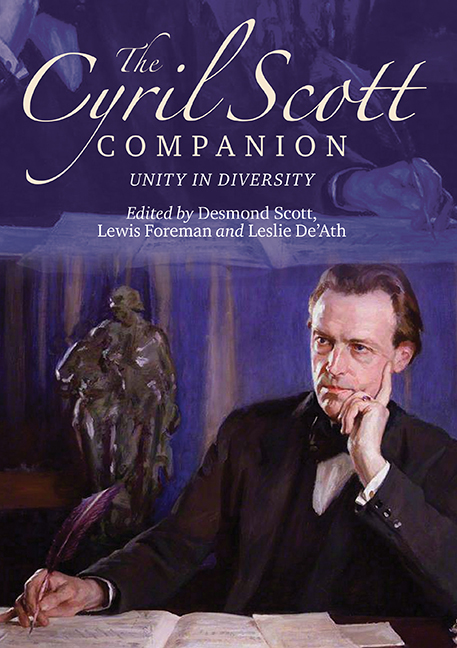Book contents
- Frontmatter
- Dedication
- Contents
- List of Illustrations
- List of Tables
- List of Contributors
- Foreword
- Preface
- Acknowledgements
- Editors' Note
- I SCOTT IN CONTEXT
- II THE MUSIC
- III THE WRITINGS
- IV PERSONAL REMINISCENCES
- 24 Cyril Scott: A Personal Memory
- 25 Reminiscences
- 26 BBC Ninetieth-Birthday Tribute
- APPENDICES
- CATALOGUES, DISCOGRAPHY AND BIBLIOGRAPHY
- Index of Works
- General Index
26 - BBC Ninetieth-Birthday Tribute
from IV - PERSONAL REMINISCENCES
Published online by Cambridge University Press: 14 September 2019
- Frontmatter
- Dedication
- Contents
- List of Illustrations
- List of Tables
- List of Contributors
- Foreword
- Preface
- Acknowledgements
- Editors' Note
- I SCOTT IN CONTEXT
- II THE MUSIC
- III THE WRITINGS
- IV PERSONAL REMINISCENCES
- 24 Cyril Scott: A Personal Memory
- 25 Reminiscences
- 26 BBC Ninetieth-Birthday Tribute
- APPENDICES
- CATALOGUES, DISCOGRAPHY AND BIBLIOGRAPHY
- Index of Works
- General Index
Summary
THIS ninetieth-birthday tribute to Cyril Scott isn't for me just the usual laudatory anniversary talk, for it's based on a friendship which beginning as a master and pupil relationship has lasted for over fifty years. It was in 1918, when I was 17, that my enthusiasm for Scott's work led to my giving a public concert of his music in my hometown of Northampton. Unknown to me, the programme of this concert was sent to Cyril Scott by one who was interested in my welfare, the Reverend S. J. Hooper, and although Scott's activities didn't include teaching, he responded to my enthusiasm by agreeing to give me some composition lessons. So began my long association with him.
I shall never forget that first meeting in London. Imagine a boy brought up in an ugly working-class area of an industrial Midlands town being ushered into a house where every object was strange, the heavy gothic furniture, the stained glass, the faint smell of incense, the writing pad containing an austere quotation from the Indian Song Celestial ‘To work thou has the right, but not to the fruits thereof’, and the piano with another quotation in large lettering painted in gold, a quotation that I couldn't complete because the end of it was lost in the curve of the instrument. At this first meeting, and after he had looked at my work, Scott played some of his music to me. Not the popular pieces such as Lotus Land or Water-Wagtail, but such pieces as Bells from the set of Poems, and the then recent Rainbow-Trout.
Cyril Scott first became known here in his own country at the beginning of the century when British music was still largely in the academic rut it had been in for a number of years, the influence of which he had escaped because he had studied in Frankfurt under a most excellent and broadminded teacher, Iwan Knorr.
Knorr used to tell those of his pupils who showed real talent and originality ‘you must learn the rules, not slavishly stick to them, but be able to break them with good taste if inspiration demands it’. And Cyril Scott did break the rules, as they then were.
- Type
- Chapter
- Information
- The Cyril Scott CompanionUnity in Diversity, pp. 403 - 404Publisher: Boydell & BrewerPrint publication year: 2018

